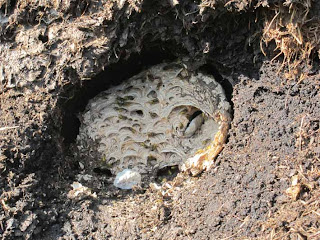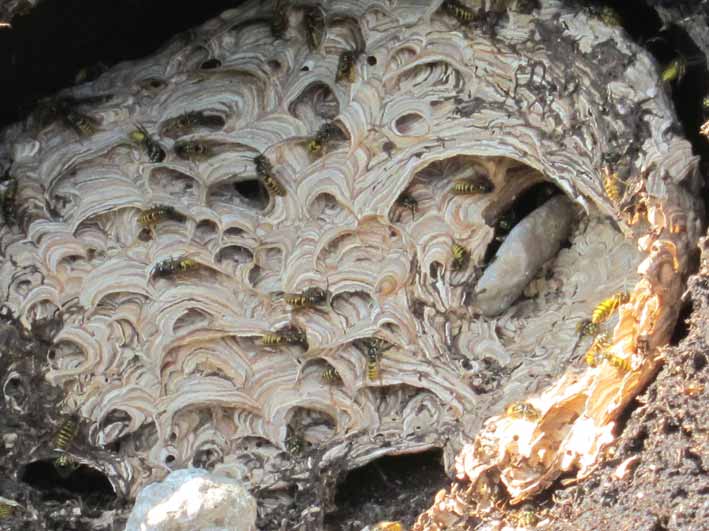3 nights ago a badger dug out a wasps nest alongside my woodstore. The nest had clearly been considerably larger than a football and all the comb and grubs were gone leaving only half the outer paper shell. The remaining worker wasps were clustered around on this having nowhere else to go. The thing that surprised me was that despite having no queen and no grubs to rear the worker wasps have continued rebuilding their nest. They are busy chewing up wood pulp from my woodstore and building a new paper structure.

This shows a close up of the work, it will be interesting to see how it develops, I had expected after 24 hours or so with no leadership, no grubs and no new eggs being laid that they would decide it was pointless and disperse but clearly they are reprogrammed and just going through the actions without thought.

This brought to mind one of my favourite authors from my youth Jean-Henri Fabre
Fabre was a fascinating character who is sometimes called the father of modern etymology, in Victorian times most folk that studied insects did so by catching them, dissecting them and arranging collections of them depending on anatomy. Fabre instead studied living insects and watched how they went about their lives. He was not well received by the scientific world at the time partly because he was not academically trained and partly because he chose to write in rather anthropomorphic prose rather than dry objective language.
His experiments and observations though were incredibly complex and insightful. A famous one involved pine processionary caterpillars. These play follow my leader each following a silken track laid down by the caterpillar in front but what if there was no leader? One day Fabre spotted pine processionaries heading up the outside of a plant pot, he led them toward the edge where they turned and headed around the rim. A minute later Fabre had a complete loop of caterpillars and he quickly swept away the others climbing the side and cleared surplus silk. He then sat down to watch how long they would follow their pore programmed behaviour, they marched for 7 days before one fell off through exhaustion and the others followed the silk over the edge.
Another experiment I remember which related to my wasps was Fabre's studies of parasitic hunting wasps. These have a set process they go through. They dig a hole, go catch some caterpillars which they paralyze with a sting and drop in the hole. Then they lay an egg on top of the food and cover the hole over. Fabre would interrupt this behavior at various stages and see what the wasp did to establish if there was any thought going on. He established the wasp was simply going through a set series of actions, for instance if he stole the paralyzed caterpillar the wasp would lay it's egg in an empty hole and seal it over without food, same thing if he stole the catapillar and egg it still sealed over the clearly empty hole because that was it's reprogrammed next step.
I shall be interested to watch my wasps over the next few weeks and see if they are bothered by the fact they have no brood to rear. Fabre's books are a joy cheap second hand and I highly recommend them.

This shows a close up of the work, it will be interesting to see how it develops, I had expected after 24 hours or so with no leadership, no grubs and no new eggs being laid that they would decide it was pointless and disperse but clearly they are reprogrammed and just going through the actions without thought.

This brought to mind one of my favourite authors from my youth Jean-Henri Fabre
Fabre was a fascinating character who is sometimes called the father of modern etymology, in Victorian times most folk that studied insects did so by catching them, dissecting them and arranging collections of them depending on anatomy. Fabre instead studied living insects and watched how they went about their lives. He was not well received by the scientific world at the time partly because he was not academically trained and partly because he chose to write in rather anthropomorphic prose rather than dry objective language.
His experiments and observations though were incredibly complex and insightful. A famous one involved pine processionary caterpillars. These play follow my leader each following a silken track laid down by the caterpillar in front but what if there was no leader? One day Fabre spotted pine processionaries heading up the outside of a plant pot, he led them toward the edge where they turned and headed around the rim. A minute later Fabre had a complete loop of caterpillars and he quickly swept away the others climbing the side and cleared surplus silk. He then sat down to watch how long they would follow their pore programmed behaviour, they marched for 7 days before one fell off through exhaustion and the others followed the silk over the edge.
Another experiment I remember which related to my wasps was Fabre's studies of parasitic hunting wasps. These have a set process they go through. They dig a hole, go catch some caterpillars which they paralyze with a sting and drop in the hole. Then they lay an egg on top of the food and cover the hole over. Fabre would interrupt this behavior at various stages and see what the wasp did to establish if there was any thought going on. He established the wasp was simply going through a set series of actions, for instance if he stole the paralyzed caterpillar the wasp would lay it's egg in an empty hole and seal it over without food, same thing if he stole the catapillar and egg it still sealed over the clearly empty hole because that was it's reprogrammed next step.
I shall be interested to watch my wasps over the next few weeks and see if they are bothered by the fact they have no brood to rear. Fabre's books are a joy cheap second hand and I highly recommend them.
